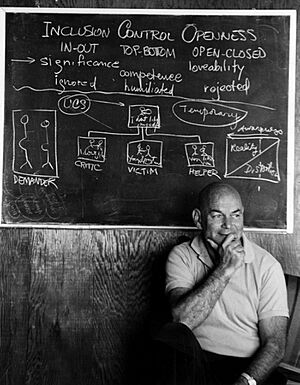William Schutz facts for kids
William Schutz (born December 19, 1925 – died November 9, 2002) was an American psychologist. He was known for his work on how people interact with each other and how groups work together. He also developed ideas about how our feelings and self-image affect our actions.
Contents
About William Schutz
His Early Life and Education
William Schutz was born in Chicago, Illinois. He studied at the UCLA and earned his Ph.D. there. In the 1950s, he was part of a group of important thinkers at the University of Chicago. This group included famous psychologists like Carl Rogers and Abraham Maslow.
Schutz taught at many universities, including Tufts University, Harvard University, and the University of California, Berkeley. He also worked at the Esalen Institute, a place known for exploring human potential.
Understanding People: The FIRO Theory
In 1958, Schutz introduced a new idea called Fundamental Interpersonal Relations Orientation (FIRO). This theory helps explain how people interact. He believed that three main things explain most human interactions:
- Inclusion: How much we want to belong to a group or be with others.
- Control: How much we want to lead or be led by others.
- Affection: How close and friendly we want to be with others.
These ideas are often used to understand how groups of people work together.
Schutz also created a tool called FIRO-B. This tool helps measure how people act based on these three dimensions. Later, he changed the "Affection" part to "Openness." This change showed his new idea that our actions come from our feelings and how we see ourselves. He believed that feeling good about yourself helps you be more open with others.
Helping People Feel Better: Body Therapy
William Schutz wrote more than ten books and many articles. He was influenced by other experts who focused on the connection between the mind and body. As a body therapist, he led workshops where people explored the hidden reasons for their health problems. He helped them find new ways to heal by focusing on their bodies and feelings.
His books, like "Profound Simplicity" and "The Truth Option," talked about these ideas. He taught that being honest with yourself, making choices, taking responsibility, and having good self-esteem are all important for well-being.
Schutz also talked about "energy cycles." These are like steps a person goes through:
- Motivation: Wanting to do something.
- Prepare: Getting ready.
- Act: Doing it.
- Feel: Experiencing the result.
William Schutz passed away in 2002 at his home in Muir Beach, California.
Who Influenced William Schutz?
Learning from Others
While teaching and doing research, Schutz studied psychology, but he also learned about philosophy and how to do scientific research. He worked with important thinkers who helped him understand how to study human behavior.
Schutz was always eager to learn. He explored many different ways to understand people and help them. He learned about:
- T-groups: These are training groups where people learn about themselves and how they interact with others.
- Psychosynthesis: A method that uses imagination to help people grow.
- Psychodrama: A way to explore problems by acting them out.
- Bioenergetics: A therapy that connects body movements with feelings.
- Rolfing: A type of bodywork that helps improve posture and movement.
- Gestalt Therapy: A therapy that focuses on the present moment and personal responsibility.
Schutz said he "tried everything physical, psychological, and spiritual." These experiences helped him combine scientific knowledge with real-life experiences and feelings.
Books by William Schutz
- FIRO: A Three-Dimensional Theory of Interpersonal Behavior (1958)
- Joy. Expanding Human Awareness (1967)
- Here comes Everybody (1971)
- Elements of Encounter (1973)
- Body Fantasy (1976)
- Leaders of Schools (1977)
- Profound Simplicity (1979)
- The Truth Option (1984)
- Joy: Twenty Years Later (1989)
- "Beyond FIRO-B—Three New Theory Derived Measures—Element B: Behavior, Element F: Feelings, Element S: Self." (1992)
- The Human Element: Productivity, Self-Esteem and the Bottom Line (1994)
 | Madam C. J. Walker |
 | Janet Emerson Bashen |
 | Annie Turnbo Malone |
 | Maggie L. Walker |


